#the decline of western civilization part iii
Explore tagged Tumblr posts
Text
On March 19, 2016, The Decline of Western Civilization Part III and Over the Edge were screened as a double-feature on TCM Underground.


#tcm underground#the decline of western civilization part iii#over the edge#penelope spheeris#jonathan kaplan#matt dillon#documentary#punk#gutter punk#coming of agge film#indie film#punk movies#fan art#art#movie art#drawing#movie history#pop art#modern art#pop surrealism#cult movies#portrait#cult film
4 notes
·
View notes
Text
This Month in History - June
Here are the landmark anniversaries I am raising a glass to this month:
June 2, 1978: Darkness on the Edge of Town released

In June 1978, Bruce Springsteen’s 4th album was released. Here is my piece I wrote in 2018. Happy 45 DOTEOT!
June 6, 1978: The Cars released

In June 1978, the debut album from The Cars was released. Here is my piece I wrote in 2018. Happy 45th The Cars!
June 8, 2018: Won’t You Be My Neighbor? opens

In June 2018, Morgan Neville’s documentary on Mister Rogers was released. I first saw it at IFFBoston 2018 and I named it my #1 Documentary of 2018 and my #4 Documentary of the 2010s. This is a doc about a decent man using children’s television to promote kindness towards others was exactly the movie we needed during the late 2010s! Happy 5 WYBMN?!
June 16, 1978: Grease opens

In June 1978, the 50s nostalgia musical to end all 50s nostalgia musicals was released in movie theaters. Here is my piece I wrote in 2018. Happy 45 Grease!
June 17, 1983: Superman III opens

In June 1983, the third feature-length Superman movie was released. This is the movie that everyone hates, that I dug. My Dad took me to see it as a kid and I really got into it. Over the years it has been raked over the coals for Richard Pryor’s distracting (but insanely funny) performance, the visual effects, and the fear of computers during the PC boom of the 80s. But my biggest argument for why this movie is awesome is that scene when the evil Superman fights Clark Kent. What an amazing scene in super hero movie history! Happy 40th Superman III!
June 17, 1983: Synchronicity released

In June 1983, the 5th and final album from The Police was released. Here is my piece I wrote in 2018. Happy 40th Synchronicity!
June 17, 1988: The Decline of Western Civilization Part II: The Metal Years opens

In June 1988, Penelope Spheeris’ epic 80s metal doc opened. Here is my piece I wrote in 2018. Happy 35th TDOWCP2:TMY!
June 22, 1993: Exile in Guyville released

In June 1993, the debut album from Liz Phair was released. Here is my piece I wrote in 2013. Happy 30th EIG!
June 26, 1998: Out of Sight opens

In June 1998, Steven Soderbergh’s best movie was released. Here is my piece I wrote in 2018. Happy 25th OOS!
#this month in history#Bruce Springsteen#the cars#won't you be my neighbor?#morgan neville#grease#randal kleiser#superman iii#richard lester#the police#the decline of western civilization part II the metal years#penelope spheeris#liz phair#out of sight#steven soderbergh#music nerd#film geek#1978#2018#1983#1988#1993#1998
0 notes
Text
Byzantium doesn’t fit well in our picture of Late Antiquity and the Middle Ages, because those categories were created to marginalize Byzantium. We have been taught that Byzantium was the left-over of the fallen Roman empire, slowly declining into insignificance. A decline lasting 1,123 years! Think about it! The reality is that Byzantium was the Roman Empire until the West, having seceded from it, erased it from history. “Byzantium in the tenth century resembled the Roman empire of the fourth century more than it resembled any contemporary western medieval state.” Late Antiquity and the Middle Ages are therefore provincial constructs that are irrelevant from a Byzantine perspective — as they are, of course, from a Eurasian perspective (what does “China in the Middle Ages”, or “India in the Middle Ages” mean?).
Even our Western notion of “medieval Christianity” is seriously biased, Kaldellis argues: “‘medieval Christianity’ is understood to be of western and central Europe, even though the majority of Christians during the medieval period lived in the east, in the Slavic, Byzantine, and Muslim-ruled lands, and farther east than that too.” Not to mention that, until the 8th century, the bishop of Rome was appointed by Constantinople.
Byzantine revisionism also means getting the Byzantine side of the story of its long struggle with the West, acknowledging that the victor’s narrative is deceptive, as it always is. We have been told that the crusades were the generous response of the West to the Byzantines’ plea for help. And if, by some historian’s indiscretion, we hear about the crusaders’ sack of Constantinople in 1204, he at least explains that “the Venetians made them do it”, or that it was a regrettable case of friendly fire caused by the fog of war. Byzantine revisionism clears that fog away. “There was never a greater crime against humanity than the Fourth Crusade,” wrote Steven Runciman.
It is hard to exaggerate the harm done to European civilisation by the sack of Constantinople. The treasures of the City, the books and works of art preserved from distant centuries, were all dispersed and most destroyed. The Empire, the great Eastern bulwark of Christendom, was broken as a power. Its highly centralised organisation was ruined. Provinces, to save themselves, were forced into devolution. The conquests of the Ottoman were made possible by the Crusaders’ crime.
Anthony Kaldellis puts it in the correct perspective:
It was in fact an act of aggression by one civilization against another, in the sense that both the aggressor and the victim were acutely aware of their ethnic, religious, political, and cultural differences, and the extreme violence that accompanied the destruction of Constantinople was driven by the self-awareness on the part of many crusaders of those differences.
It is good that John-Paul II publicly apologized for the fourth crusade 800 years later, but it doesn’t change the fact that his predecessor Innocent III had responded to the news of the conquest of the city with joy and thanksgiving, and immediately tried to mobilize a fresh round of soldiers, clerics and settlers to secure the new Latin empire. In a sermon given in Rome and repackaged as a letter to the clergy accompanying the crusaders, “Innocent describes the capture of Constantinople as an act of God, who humbles the proud, renders obedient the disobedient, and makes Catholic the schismatic. Innocent argues that the Greek failure to affirm the filioque (a Trinitarian error), is akin to the Jewish error of not recognizing Christ’s divinity. And, as such, the pontiff suggests that both Greek error and their downfall were predicted in Revelation.”
[...]
Byzantine revisionism is controversial because it challenges not only the image that Westerners have of Byzantium, but also the image that Westerners have of the West. We are the civilization of the crusades, that have destroyed Byzantium, and have since tried to destroy all civilizations that stood in the way of our hegemony. We should know, at least, that this is the way Russia and much of the world is seeing us. As I have argued in “A Byzantine view of Russia and Europe,” we cannot understand Russia without doing some Byzantine revisionism, because Russia is Byzantium redivivus in many ways.
[...]
The best contribution of Anthony Kaldellis to Byzantine studies is the new light he shines on the true nature of Byzantine civilization, by first pealing off layers of Western prejudice, polemic, and deceit, but also by reading through Byzantium’s own imperial propaganda.
For example, Kaldellis argues that Christianity, although essential to Byzantine identity, was not as central and exclusive in everyday life as we have been led to believe, by reading too many ecclesiastical authors. Even during the reigns of Justin and Justinian, reputed to be an era of intolerant Christian orthodoxy, many officials and intellectuals showed not even nominal Christian faith: such is the case of the historian Procopius, who speaks of “Christians” as if excluding himself from that group, and regards as “insanely stupid to investigate the nature of God and ask what sort it is.” As I have argued elsewhere, the very name given by Justinian to his architectural masterpiece—the world’s greatest building for one thousand years—testifies to his high regard for Hellenism: Hagia Sophia, or Holy Wisdom, is the goddess of philosophers, not theologians.
-- Laurent Guyénot, Byzantine Revisionism Unlocks World History
25 notes
·
View notes
Note
forgive me if i don’t make sense bc i don’t really know how to articulate this, but taliesin talked a lot about “trying to figure out what punk means in exandria” and wondering what’s there to be angry about. and after the last string of episodes i feel like that it’s a question that he baked into ashton’s character. like yes ashton is punk and they have justified anger but the Rest of their anger is deflective to stop them from interrogating themselves and their decisions further. idk it’s really interesting to me
It is! It's something I really love about Ashton and it's something I think Taliesin was very thoughtful about in his character creation. I think Taliesin is extremely strong in character creation in general, and it's a rare person who can make a character based on a philosophical premise who also feels very real.
That really is the core of Ashton, and I think it's a great commentary. I do still intend to watch The Decline of Western Civilization Part III (winter break perhaps?) but I am broadly familiar with the gutter-punks on which Ashton was based, and again, the punk movement as a whole. There have always been politically-minded punks; but I advise you look up the backgrounds of, say, the average Fugazi/Minor Threat, Bad Religion, Dead Kennedys, or Propagandhi musician because they are, by and large, middle-class white guys with relatively stable and happy childhoods, and the idea of Ashton as someone dedicated to the Tumblr uwu kindness is punk "look at this perfect baby who doesn't steal pennies how kind and generous to only take literally everything else" archetype was always a massive projection. They've always been far more in the model of the Break Shit, Get Wasted punk than, well, the straight edge and veganism of the above.
(I also think that while it's true that a lot of punk houses did take in anyone and were something of a refuge for many a la Color In Your Cheeks, there was also a lot of Missing Stair Fallacy shit going on in the punk community even then. Ashton is in fact an example of the flaws in that sort of subculture: the Nobodies were there until they really, really weren't, and that's not unusual for that kind of punk friendship. It's found family until you're too inconvenient and dangerous to make it worth it. Taliesin explores this a lot, incidentally; that was very much what he was doing with Molly, and I would love to hear him talk about that kind of surface-level closeness that isn't strong enough to stick because as someone who both participates in fandom and loves to observe and analyze fandom as a phenomenon itself, it's a very real dynamic.)
Ashton has had an awful life. That's the premise. Nothing good has happened to them. There are plenty of valid reasons for them to be angry. Some are people who deserve it (their parents for the fucked up ritual; the Nobodies for abandoning them; Jiana Hexum for exploiting them), some are people who don't deserve their anger but to be fair haven't done anything to deserve their respect either (Percy, the gods), but many have been perfectly kind and reasonable and Ashton has rejected them because they're in a position of authority or seemed too nice. And there's plenty of stuff he's mad about that isn't easily pinned on anyone; the chronic pain is a shitty side effect of one or both of his traumas but no one person is responsible.
Ashton is an incredibly cynical person, and this extends to himself. As I've said before, I think they absolutely mean it when they say that they would have done the exact same thing the Nobodies would do, and this has been used to both cover up the intense hurt that came from their abandonment, but also, I think part of Ashton's own self-loathing comes from the fact that yeah, they are the kind of person who'd have done the same, and that isn't a very good person, and being angry at the Nobodies and Jiana and the world at large has allowed him to avoid looking that truth in the face. Ashton has always bounced between "I'll be the best broken thing I can be" and "what if I could be more? what if I could be what I could have been if things went well?" and also "who the fuck cares" and the reveal, that when the chips are down, he will make an ill-advised and self-destructive choice from that place of pain and anger has really rattled them. He can't keep just being angry and using that to shield himself from difficult questions. It won't just kill them, but it will hurt everyone around them too.
A really ugly truth of life is that even when something is completely not your fault and even when you have been dealt a rotten, unfair hand, often, you do have some degree of responsibility to deal with it ("And if it isn't my fault, I certainly didn't do anything to deal with it," as Ashton says.) The mere act of being angry is cathartic but doesn't actually solve anything. I think that's Keyleth's message to Orym, actually; it's not fair, and you're angry that it's not fair, but you need to use that anger to do things yourself instead of letting it consume you or passing the buck because it sure as hell isn't your turn. Ashton has, since the solstice, been playing tug of war with the idea that this anger has perhaps not been serving him, and he finally lost. Initially they realized a lot of this anger had been self-pity, but then, as they said, one week of thinking their parents actually were something led them to do the exact same dumb cult shit. Instead of stopping and listening to Evontra'vir and Allura, he said "no, I'm special, actually." And to be clear I think their motives were incredibly complicated and well-thought-out on Taliesin's part. It's not just because of his parents, it's not entirely selfish or out of heroics but those certainly did play a part, he did genuinely think it would help but he also ignored a number of warnings that it wouldn't. Again, I think the parallels between Ashton and FCG are glaringly obvious this episode, except Ashton hid their feelings with anger and FCG with a focus on everyone else's needs.
125 notes
·
View notes
Text
Russian-Ukraine War Part 4: The Birth of Russia

So Russia is big. It's like one of their defining traits, vodka, art, brutality, colonialism, communism, and being massive. But did you know that once Russia was once…not so big? Let's do some history.
So the Mongolian Empire was a brutal genocidal engine of conquest but if you survived the initial invasion, it wasn’t so bad by the standard of brutal imperialists, the Mongols were big on religious tolerance, cultural integration and above all trade. So the Russians found themselves suddenly connected to Central and East Asia through their Mongol overlords, and Russia for the first time in Russian history, it is as connected to East Asia as it is to Europe.
The Mongolian Empire was great at conquest but struggled a lot with the ruling, and it probably won’t surprise you that it broke into 4 smaller states shortly after the death of Genghis Khan, located in the Middle East, China, Mongolia and Russia Respectively. The one that concerns us is the Golden Hoard, the Russian based Mongolian state, who were called “Tatars” by the locals.
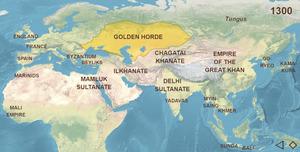
The Golden Hoard wasn’t an Empire that spent most of their time breathing down your neck and setting major policies in their capital, instead they ruled indirectly via tributary states. They would basically allow your kingdom to exist and kinda do its own thing as long as you paid your taxes, and one special boy kingdom was allowed the honor of collecting the taxes. The special boy of our story is the Grand Duchy of Moscow, which will overtime be upgraded to the Principality of Moscow, to the Grand Principality of Moscow as they steadily get more and more powerful, using the privileges they got as the Mongol’s special boys to eventually grow their military and economy.
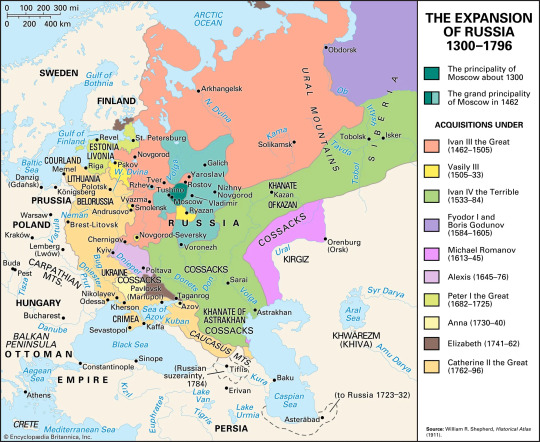
Eventually they were able to push back the Mongols (assisted by the Golden Hordes constant civil wars), and by the time of Ivan the III aka Ivan the Great, the state was independent and a massive nation. Ivan III is kinda seen as the first independent Ruler of Russia, where Russia exists in its own right and not just as a Mongolian Tributary state. Ivan’s grandson, Ivan the IV, aka Ivan the Vasilyevich, aka Ivan Grozny, aka Ivan the Terrible eventually decided that the Title of Grand Prince wasn’t quite good enough and so it was he who formally turned the state into an Empire, giving himself the title of Tsar, after brutally conquering all the people around him. And so the Russian Empire was born between Ivan the Great and Ivan the Terrible, go figure.
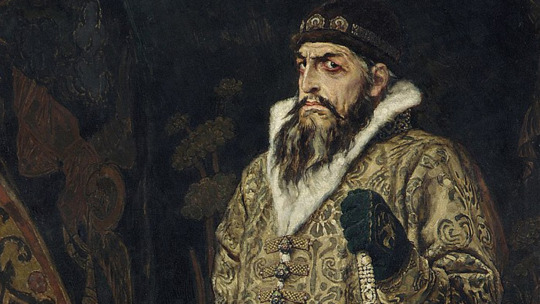
(Ivan the Terrible, Very stable man)
So Ok, Russia is an independent Empire, but under Ivan the IV it becomes more than that, it becomes the Orthodox State. Let me walk back a bit. Christianity first super huge split was in 1054, where the Eastern Greek Speaking Orthodox Church broke apart from the Western Latin Speaking Roman Catholic Church. The Catholics have the Pope, who manage to establish himself as a religious power greater than even Kings, while the east had the Patriarch, whose power was limited by the Emperor? What Emperor you say? Well time to talk about the Byzantine Emperor
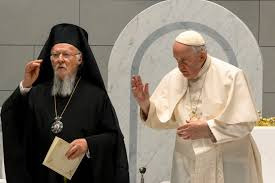
Patriarch (left) Pope (right)
So the Byzantines are the dominant supreme cultural power of the East right? Well by the time of the Mongols, not so much. The great city of Constantinople was sacked in 1204 by the 4th Crusade, in one of the greatest own goals in history, and the Empire was in a state of decline ever since. And I mean actual decline, not Edward Gibbon (your decline is almost a thousand years) decline, which was pretty upsetting for the Rus, the other great Orthodox power (Ok I see you Bulgaria and Romania, you’ll get your own episodes another time calm down), and as Byzantine declined, Muscovy keep taking on more and more of the role as “big Orthodox power of the east”. But the striking blow came when Constantinople fell in 1453 to the Ottoman Empire under Mehmed the II aka Mehmed the Conqueror, bringing a final end to the Byzantine empire…ok there were a few splinter states but Mehmet gets them 20 years later so once and for all Byzantines are gone.
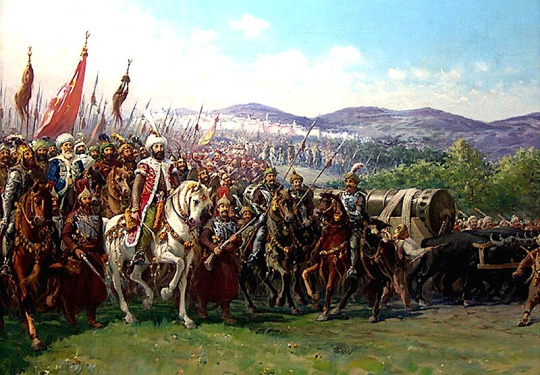
(Mehmet II preparing to destroy Byzantinium)
SO I cannot empathizes enough how much of a blow this is to the Orthidox World. The Byzantine Empire was THE Orthidox power for over a thousand years, it was the center of the Orthidox world.Consantinople had been the center of the Orthodox church since Constantine himself, it's like Rome turning Muslim or Mecca Christian, like this is a theological crisis. However, the Grand Principality of Moscow was eager to take on the role of center of the Orthodox Church, and Ivan the Great started to call Moscow “The Third Rome” to succeed the Byzantines as the Byzantines had “succeed” the Romans (despite being Roman…look i never said it is smart). This is why Russia’s coat of Arms is the two headed eagle of the Byzantines. His grandson Ivan Grozny unified the Principality into a strong centralized autocratic state through the power of brutal oppression and secret police, creating the Russian Empire. Later the Patriarch would relocate there, effectively the closest thing to the head of the Orthodox church, making Moscow the new center of the Orthodox faith.

As the "Third Rome" Russia wasn't just an Empire, it had a divine mandate to take territory and spread the Orthidox Faith. The notion of this Russian style Manifest Destiny is going to come up again in this series, and it has never completely left the Russian National identiy.
Ivan took the title of Tsar which means Caesar as in Emperor. As an Empire rather than a Principality, the “Divine Mandate” of Russia became to serve as the protector of the Orthodox Church, to reunify the old Kievan Rus, and restore Constantinople. Like most empires, including the Mongol, the Russian Empire is based on the notion that they have a divine right to rule over everybody else. This dream was put aside for the Time of Troubles, a civil war so horrific that it makes Game of Thrones look peaceful, but after that confusion Russia was ready to go (this is where the Royal family goes from Ruik to Romanov) This is not going to be an extensive look at all of Tsarist Russia, just the stuff which I think is important to understand for Ukraine. Colonization, the Tsar and Serfdom.
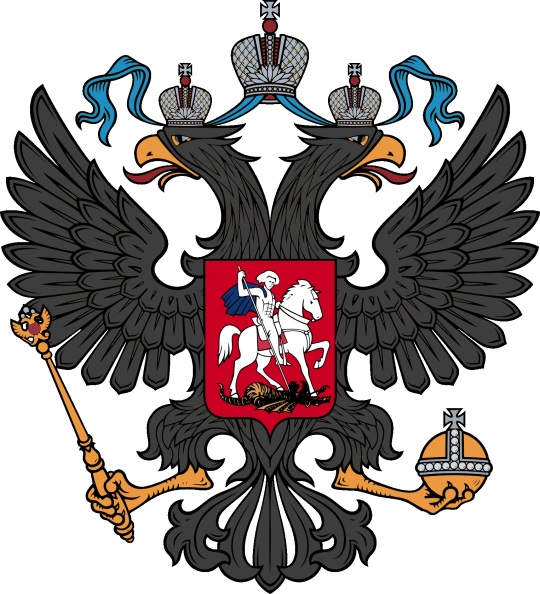
#Neglected Historical Fact#Russian History#Ukranian History#Russia#Ukraine#Golden Hoard#Mongolian Empire#Byzantine Empire#Orthidox CHurch#Great Schism#Ivan III#ivan the terrible#Ivan the Great#Third Rome#Tsar#Imperial Russia#Time of Troubles
10 notes
·
View notes
Note
WABAM!
I just hit you with the ‘Tell me about yourself!’ ray!
Now you’ve gotta answer these questions about yourself!:
•What’s your favorite food?
•Favorite movie?
•How old are you?
•What song are you currently obsessed with?
•What’s your dream job?
•What’s your favorite color?
After answering these questions, leave this in the ask box of 5 other people! :3
Noice 👍
Favourite food: tiramisu
Favourite movie: fictional = Dead Poets’ Society, documentary = The Decline of Western Civilization part III
Age: I was born this very moment. I have lived a million lifetimes. I cannot yet drive a car.
Current song obsession: Model Village by IDLES
Dream job: artist of informative zines/ graphic novels/ anything both creative and making the world a better place.
Favourite colour: warm, rich, dark reds that you could curl up in and have the most comfortable sleep of your life.
3 notes
·
View notes
Text
The Decline of Western Civilizaton part I, The Decline of western Civilization part II: The Metal Years, The Decline of Western Civilization part III
If you are a fan of music (70s punk, heavy/glam metal, and the sadness that is the 90s gutter punk) you can watch the whole documentary series of The Decline of Western Civilization parts I-III free on Tubi Tv.
But shhh, don't tell no one. ha ha
#the decline of western civilization#70s punk#80s glam metal#heavy metal#90s punk#punk rock#70s music#80s music#90s music#part 3 is sad because it deals with the homeless teen population in the 90s
2 notes
·
View notes
Video
The Decline of Western Civilization Part III
0 notes
Photo
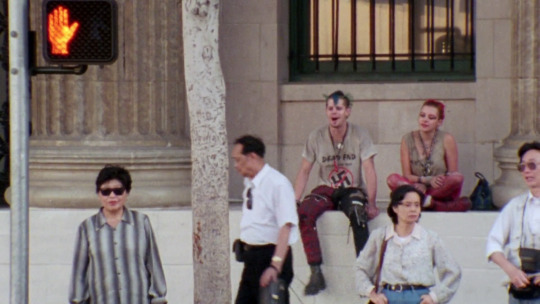
The Decline of Western Civilization Part III, Penelope Spheeris
#the decline of western civilization part iii#The Decline of Western Civilization#penelope spheeris#documentary#doc#cinema#cinematography#gutter punk#punk#screencaps#stills
61 notes
·
View notes
Text
Remembering The Decline of Western Civilization Part III star, Squid, on the anniversay of his death.

#rest in peace#squid#the decline of western civilization part iii#art#documentary#punk#punk rock#punk art#drawing#r.i.p.#movie art
8 notes
·
View notes
Photo

The Decline of Western Civilization Part III (1998) Penelope Spheeris.
5 notes
·
View notes
Photo


The Decline of Western Civilization Part III - dir. Penelope Spheeris, 1998
#the decline of western civilization#the decline of western civilization part iii#film#punk#documentaries#have been ploughing through this documentary trilogy bc i am obsessed with the history of counterculture and social movements#post#ok to rb dats why i used all those tags#23
102 notes
·
View notes
Text
Movie Review | The Decline of Western Civilization series (Spheeris, 1981-98)
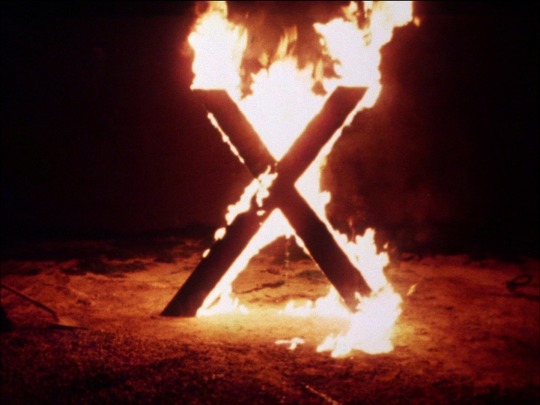
Many years ago, before I sold out to the man, I have to admit I felt a certain attraction to punk music. No, I was never anywhere close to a full on punk (I was, and still am, extremely lame), but I have to admit the anti-establishment streak definitely resonated with me at a certain point of time. (Not that it still doesn’t, but in addition to selling out, I’ve softened with old age.) Like many people I’ve found appealing the political conscience and mix of influences of the Clash, or the boneheaded energy of the Ramones, but I also found my interest straying to hardcore punk. I remember the first time I listened to “Damaged II” by Black Flag and finding it unbelievably abrasive and foreign to my ears, yet it was something I couldn’t get out of my head, and returned to the song and the album it was from a few years later and appreciated it as one of the most forceful expressions of angst ever recorded. I remember first learning of bands like X and Fear, and seeing performance footage on YouTube and being thrilled by the rawness and danger, especially when they had to fight off their fans. This footage was from Penelope Spheeris’ cult classic documentary, The Decline of Western Civlization, which for years was not easily available but I have now finally seen in its entirety.
The movie is structured simply, moving from one band in the L.A. punk scene to another, interviewing them in their natural habitats and punctuating this with footage of their performances. Songs are presented in full so we can get the complete experience. The first band we see is Black Flag, then with frontman Ron Reyes. They are lively on stage but it’s interesting to note how different the energy was prior to the arrival of Henry Rollins, who brought a certain discipline and muscularity to their music. (One of the songs featured here, “Depression”, pops up again in Damaged, and the impact in the latter is noticeably more forceful.) The guys here come across as aimless and destitute, living in a decrepit church where they’ve turned the closets into makeshift bedrooms, seemingly losing money with every gig. But they are also quite affable (you can tell the lyrics of “TV Party” sprang from these minds) and do not have illusions about their situation, especially their difficulty in getting gags thanks to their rowdy fans. These scenes play like a moment frozen in time, right before the band’s most significant period would begin. We move next to the Germs, and these scenes play like a car accident in slow motion, with Darby Crash’s self-destructive tendencies on full display. This was a short time before his death, which occurred between completion of filming and the theatrical release (his image was featured heavily on the promotional materials), once again giving this a lost in time quality.
Next we go to the headquarters of Slash Magazine, the staff of which moonlights as a band called Catholic Discipline. The frontman complains about New Wave, claiming it doesn’t actually exist, yet they come across as downmarket New Wavers who are slumming it in the punk scene. Yet their love of music and their work is obvious and the frontman does possess a certain charisma. Much of what we see of the punk lifestyle is squalid and dismal, yet the music of X manages to poeticize this condition. Their unassuming demeanours during their interview contrast sharply with their vigour in their performances, during which they do their share of batting off overeager fans. We get a burst of political conviction when the Circle Jerks launch into the libertarian anthem “Red Tape”, but this dissipates by the time they start playing “I Just Want a Skank”. We spend some time with the Alice Bag Band and then are treated to a montage of interviews with punk fans. These are shot in monochrome with stark backgrounds and a single bulb providing the lighting, which has the effect of bringing them and their words into sharp relief. We hear similar stories again and again, of aimlessness and aggression, the subjects using the music both as an outlet for their frustrations and inspiration for violence.
Spheeris’ camera has been largely nonjudgmental, yet there’s an undeniable sadness in this sequence. But lest I make it sound that the movie makes punk seem uniformly depressing, the closing sequence provides a potent antidote. The electrifying final minutes of the film feature a performance by Fear (who are not interviewed). The atmosphere here is hostile, with the band riling up the audience with homophobic and misogynistic taunting and having to physically fight them off throughout their set list. It might be tempting to liken their shtick to cheap alt-rightish provocation, but I think that robs their music of the proper context. When almost all their peers and fans adopt an attitude of “everything sucks”, Fear’s ability to find the humour in that mentality is kind of refreshing. It also would ignore the sheer muscularity of the delivery, which almost turns the music into a form of violence. The film is undeniably a fascinating document, but while Spheeris may have had the good fortune of turning on her camera in the right place and right time (even if she had to pay to rent soundstages to film some of the performances), it’s moments like this of pure exhilaration that cement the film’s greatness.
Part II: The Metal Years takes place almost a decade later, with a drastically new context and perspective. This time the focus is on the L.A. metal scene, which was a dominant cultural force unlike hardcore punk ever was. And this time around Spheeris’ POV is less of impartial observation and more satirical condescension. Taken journalistically, the movie is obviously compromised, particularly in an interview of Ozzy Osbourne that’s misleadingly edited to make it look like he has the shakes. I wish the movie hadn’t done this, as Ozzy is a flamboyant enough presence that he’s already funny without needing to frame him into gags, something Spheeris acknowledged in an interview years after the fact. Ozzy and a few other veterans of the scene are not immune to metal culture’s innate ridiculousness (the movie’s biggest laugh for me was Spheeris’ deadpan reaction to Steven Tyler’s extended masturbation metaphor to describe the rock’n’roll lifestyle). It’s worth noting that Spheeris asked her subjects how they wanted to be filmed, leading to such choice setups as Gene Simmons in a lingerie store and Paul Stanley in a bed full of scantily clad models. (Lemmy allegedly took offense to how he was portrayed, claiming Spheeris shot him from afar to make him look stupid, but I don’t think he comes across badly. He’s low key and unassuming in a way that contrasts him from the other participants, at the very least in terms of appearance).
The structure of this entry is tighter, using snippets of different interviews to flesh out different ideas, exploring the decadence and excess of the music and the surrounding culture. We even hear from the anti-metal folks, particularly in one amusing scene where a woman describes the dangerous potential of metal fashion with the solemnity of a cop or anti-gun advocate describing illegal firearms. Performance footage is limited to brief excerpts, usually for comic relief (assless chaps and a limp attempt to set fire to a Soviet flag are highlights), although we do get an extended look at a sleazy stripping context. (The club owners featured seem as much into the metal lifestyle as some of the musicians and fans, in sharp contrast to the genial working class types featured in the first and third entries.) The most notorious segment of the film is the interview with Chris Holmes from W.A.S.P., who lounges in a pool in alcoholic self loathing, which probably went farther in deflating the excitement around the metal scene than any single moment. Yet like the first film, this one refuses to lock into too narrow view of its subject and rebounds with a Megadeth performance that goes a long way in showing that yes, this music can in fact be good. (I should say that I enjoy my share of hair metal, which Megadeth is decidedly not, but the songs earlier in the film don’t do the best job of selling the genre. Although anything would look lame with assless chaps.) This movie is more obviously flawed than the original, but I can’t help but kind of love it. The fact is that the metal musicians and fans, despite being somewhat boneheaded, are also full of good vibes and fun to hang around (more so than the self-serious punk fans in the original), and the movie is quite slick and stylish by documentary standards, which makes the film true to its subject matter in a a way. I mean, you open the movie with Motorhead and I’m half won over already, and I haven’t stopped thinking (and smiling) about it since I’ve seen it.
The good vibes don’t carry over to Part III, which follows a group of homeless gutter punks in L.A. around another decade later. Once again there’s a change in context and perspective, with Spheeris coming across as more compassionate and maternal. The musicians here offer a more sobering, grounded presence. The veterans here, Keith Morris and Rick Wilder, come across as survivors more than anything, particularly the latter with his skeletal, emaciated appearance. The music this time around is almost beside the point, although we do get the sense that it offers the main subjects one of their only sources of relief. Their stories are similar. Broken homes. Forced onto the streets. Substance abuse. The movie feels like extended versions of the Darby Crash scenes and the interviews from the original, but with the grim consequences covered in the final moments, and the film’s sense of despair is alleviated only by the compassion Spheeris brings to the material. I can’t see myself returning to this as readily as it’s more downbeat and less dynamic than the previous movies, but it is undeniably moving, and had a profound effect on Spheeris as well, who decided to become a foster parent after her experience making this movie.
#film#movie review#the decline of western civilization#the decline of western civilization part ii: the metal years#the decline of western civilization part iii#penelope spheeris
5 notes
·
View notes
Photo
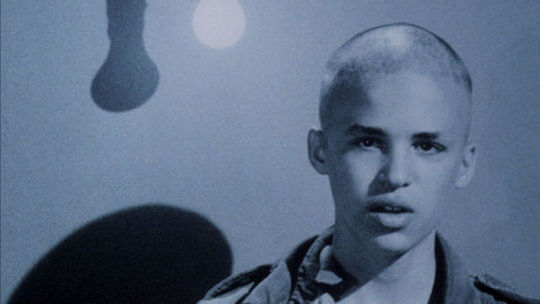

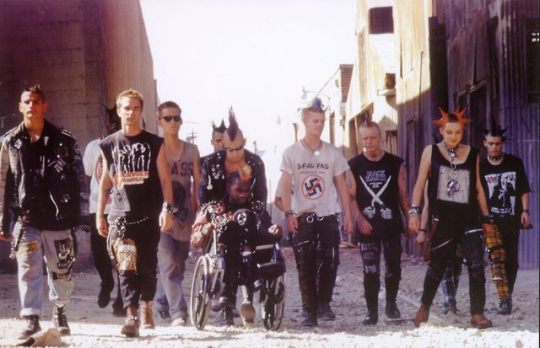
The Decline of Western Civilization (1981)
The Decline of Western Civilization Part II: The Metal Years (1988)
The Decline of Western Civilization Part III (1998)
#The Decline of Western Civilization#The Decline of Western Civilization Part II: The Metal Years#The Decline of Western Civilization Part III#music#history#documentary#female directors#penelope spheeris#l.a. punk#metal#heavy metal#gutter punk#1981#1988#1998
968 notes
·
View notes
Text
#the decline of western civilization part iii#film#review#criterion channel#penelope spheeris#documentary#concert film
1 note
·
View note
Text

Penelope Spheeris directs Rob Lowe and Mike Myers on the set of Waynes World (1992). Waynes World was the number six biggest blockbuster hit of the year, making Penelope the third female director with a blockbuster hit, after Amy Heckerling and Penny Marshall.
Penny was born in New Orleans and has 38 director credits from a 1969 short, to a 2012 tv movie, The Real St Nick. Her other notable credits include her first feature, the 1981 punk rock documentary The Decline of Western Civilization, as well as parts II and III, The Beverly Hillbillies, and five heavy metal videos.
6 notes
·
View notes